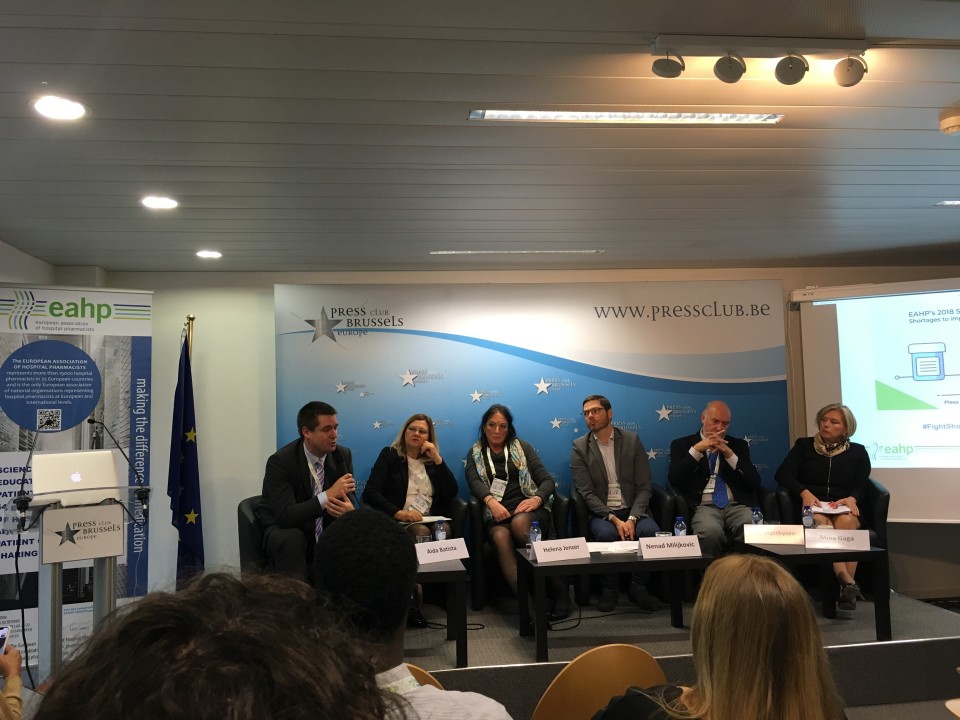This information originally appeared on the previous EHA website. Links to other pages may be inactive.

EHA welcomes initiatives but calls for more focus on causes
Medicine shortages have a negative impact on the quality and cost of treatments and on patient access to the best possible care. EHA has helped flag the problem with policymakers and regulators, but lack of data and understanding of the causes make it notoriously difficult to tackle.
EAHP shortages survey
On November 7 in Brussels, the European Association of Hospital Pharmacists (EAHP) presented the results of an extensive member survey on medicines shortages in European hospitals. EAHP warmly encourages EAHP’s efforts to lead data collection on availability issues, the scope and complexity of which are being recognized by all stakeholders.
The survey results show that the issues are multi-fold, widespread and have considerable impact on the quality and availability of patient care. They do, however, offer little insight into the causes of unavailability of medicines. The lack of information on causes – in absence of a comprehensive and effective system for registering causes in most countries – means that the focus is mostly on dealing with the consequences, rather than addressing the root of the problems.
Responding to a suggestion from EHA that a follow-up exercise to map the causes of shortages could be of great value, EAHP leadership indicated that they consider the survey a starting point and plan to continue work on this issue, with input and collaboration from stakeholders including EHA.
Regulators’ task force on availability issues
Two days after the EAHP event, the European Medicines Agency (EMA) and the Heads of national Medicines Agencies (HMA) hosted a workshop on the availability of authorized medicines in London. EHA was represented by Prof Margarita Guenova, an active member of various EHA committees and President of the Bulgarian Society of Hematology, who had expressed a strong interest in the issue during an annual EHA dinner for national society leaders.
“The multi-stakeholder workshop on availability of authorized medicines in Europe, organized by HMA/EMA on the November 9 in London was a very important step in attempts to find working solutions. Virtually all categories of parties involved in the problem were given the opportunity to present their perspective, e.g. representatives of the European Commission, World Health Organization, European and national regulators, industry, patients, medical practitioners, pharmacists and international medical organizations,” she said looking back at the workshop.
Drug shortages were recognized as an important and increasing problem at national, European and global level with a significant impact on patients’ lives and on public health. The problem is complex and multifactorial, and contributes to further inequalities across Europe. There are no quick solutions, however, a strong will was evident on all sides to identify concrete measures to address the problems. The first steps have been initiated, first and foremost the development of a European system for reporting and analyzing shortages which is a key challenge in this process. Ideally, this system should register the specific shortages in all countries, keeping track not only of details such as which products are unavailable and for how long, but also on the specific causes of lack of availability.
In-depth analysis of the causes, irrespective of whether they are related to production, supply and distribution or due to economic or price policy differences, is the proper way to look for sustainable solutions for the benefit of the patients and the equal human right for access to adequate healthcare. As the mission of EHA is to promote excellence in patient care, it should be an active participant in the discussions and a source of reasonable suggestions in the field of hematology.
For more information on the HMA/EMA Task Force on Availability of Authorised Medicines for human and veterinary use (TF AAM), see here.
Find EHA’s statement on availability of medicines, prepared for the HMA/EMA task force after the workshop, here.
Advocacy and policy pages on the EHA website: here